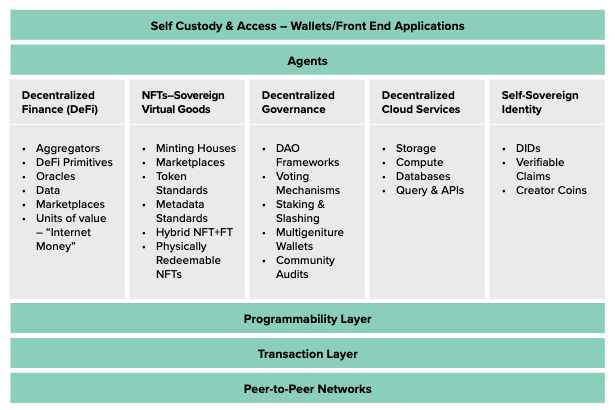A leader in crypto investing is making the case for a $1 trillion Metaverse that will compete with current internet — or Web 2.0 — companies.
In a report, analysts from Grayscale Investments estimate that the market opportunity for creating the Metaverse would be worth over $1 trillion in annual revenue. At that size, the analysts say the metaverse — or Web 3.0 — and may compete with Web 2.0 companies worth about $15 trillion today.
The stakes are much higher for a functional Metaverse, they add.

“This vision for the future state of the web has the potential to transform our social interactions, business dealings, and the internet economy at large,” the analysts write.
Metaverse technologies have already experienced an incredible surge in growth in innovation, productivity and revenue.

The Grayscale analysts report: “Web 3.0 Metaverse virtual worlds are creating real-world value for the developers, third-party creators, and users building these emerging market internet-native crypto cloud economies. All-time value spent on Web 3.0 Metaverse item sales such as virtual land, goods, and services has topped $200 million.”
They add that Metaverse virtual worlds have nearly 50,000 all-time users, up an amazing pace of nearly 10 times since 2020.
Much of this growth has come at the expense of the centralized companies in traditional online spaces.
During 2021 Q3, crypto fundraising totaled $8.2 billion. The Web 3.0 and NFT — Non-Fungible Tokens– segment was set at about $1.8 billion. Within that sector, blockchain-based gaming attracted about $1 billion in funding across 14 deals, which made it that category’s top sub-sector.
This trillion-dollar potential is being driven by several trends.
First, more people are spending more time engaged in digital activities. As people spend more time there, they naturally spend more money there, the analysts write. Gaming is another major influence on the drive toward Web 3.0, they add.
“Our social lives and gaming are converging and creating a large, fast-growing virtual goods consumer economy,” the analysts report. “It is estimated that revenue from virtual gaming worlds could grow from ~$180 billion in 2020 to ~$400 billion in 2025.”
“The Crypto cloud economies” are the next emerging market investment frontier and the Metaverse is at the forefront of this Web 3.0 internet evolution,” the analysts predict.
Grayscale explains the evolution of the web as a series of technological advances in connecting people. The internet has always been about connecting people. They envision the three key eras of online communities as Web 1.0, connected by browsers, such as Netscape. Web 2.0 includes social media sites, such as Facebook, which created online communities. Web 3.0 created community owned virtual worlds, for example, Decentraland.
The analysts define the metaverse as a set of interconnected, experiential 3-D virtual worlds that enables users to socialize in real-time forming “a persistent, user-owned, internet economy spanning the digital and physical worlds.”
anywhere can socialize in real-time to fAs traditional businesses moved to the web and then mobile-heavy Web 2.0, the analysts see evidence that these businesses will create Web 3.0 models.
They list the following businesses on Decentraland and other virtual worlds: art galleries, such as Sotheby’s; business offices, such as Binance; games and casinos where players can win MANA; advertising, sponsored content and music ventures.
Interestingly, but not at all coincidentally, Facebook has morphed to a Web 3.0-sounding “Meta.” Grayscale said this pivot may serve as a catalyst for other companies to ramp up Metaverse participation.
Grayscale Investments is a digital currency asset manager. Through its family of investment products, Grayscale provides access and exposure to the digital currency asset class in the form of a security without the challenges of buying, storing, and safekeeping digital currencies directly.
If you found this article to be informative, you can explore more current Digital Twin news here exclusives, interviews, and podcasts.













